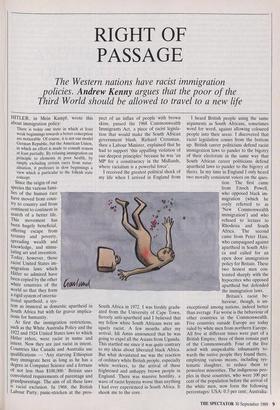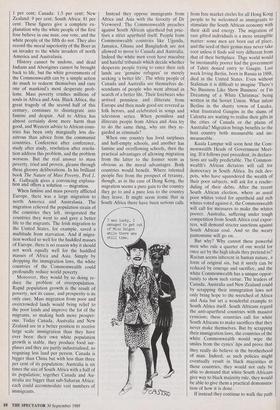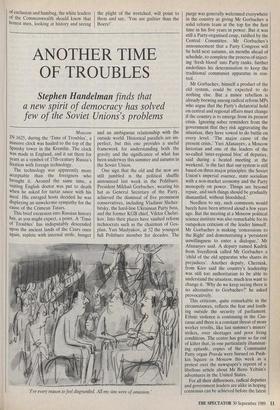RIGHT OF PASSAGE
The Western nations have racist immigration
policies. Andrew Kenny argues that the poor of the
Third World should be allowed to travel to a new life
HITLER, in Mein Kampf, wrote this about immigration policy: There is today one state in which at least weak beginnings towards a better conception are noticeable. Of course, it is not our model German Republic, but the American Union, in which an effort is made to consult reason at least partially. By refusing immigration on principle to elements in poor health, by simply excluding certain races from natur- alisation, it professes in slow beginnings a view which is particular to the folkish state concept.
At first the immigration restrictions, such as the White Australia Policy and the 1922 and 1924 United States laws to which Hitler refers, were racist in name and intent. Now they are just racist in intent. Countries like Canada and Australia use qualifications — 'Any starving Ethiopian may immigrate here as long as he has a degree in Computer Science and a fortune of not less than $100,000.' Britain uses convoluted requirements of parentage and grandparentage. The aim of all these laws is racial exclusion. In 1968, the British Labour Party, panic-stricken at the pros- pect of an influx of people with brown skins, passed the 1968 Commonwealth Immigrants Act, a piece of racist legisla- tion that would make the South African government blush. Richard Crossman, then a Labour Minister, explained that he had to support 'this appalling violation of our deepest principles' because he was 'an MP for a constituency in the Midlands, where racialism is a powerful force'.
I received the greatest political shock of my life when I arrived in England from South Africa in 1972. I was freshly gradu- ated from the University of Cape Town, fiercely anti-apartheid and I believed that my fellow white South Africans were un- iquely racist. A few months after my arrival, Idi Amin announced that he was going to expel all the Asians from Uganda. This startled me since it was quite contrary to my ideas about liberated black Africa. But what devastated me was the reaction of ordinary white British people, especially white workers, to the arrival of these frightened and unhappy brown people in England. There was massive hostility, a wave of racist hysteria worse than anything I had ever experienced in South Africa. It shook me to the core.
Britain's racist be- haviour, though, is un- exceptional among nations, indeed better than average. Far worse is the behaviour of other countries in the Commonwealth. Five countries outside Europe are today ruled by white men from northern Europe. All five at different times were part of a British Empire; three of them remain part of the Commonwealth. Four of the five acted with unspeakable inhumanity to- wards the native people they found there, employing various means, including sys- tematic slaughter, to reduce them to powerless minorities. The indigenous peo- ples in these countries, who were 100 per cent of the population before the arrival of the white men, now form the following percentages: USA: 0.5 per cent; Australia:
1 per cent; Canada: 1.5 per cent; New Zealand: 9 per cent; South Africa: 81 per cent. These figures give a complete ex- planation why the white people of the first four believe in one man, one vote, and the white people of the fifth do not. They also record the moral superiority of the Boer as an invader to the white invaders of north America and Australasia.
History cannot be undone, and dead Indians and Aborigines cannot be brought back to life, but the white governments of the Commonwealth can by a simple action do much to redeem themselves and cure one of mankind's most desperate prob- lems. Mass poverty crushes millions of souls in Africa and Asia. Black Africa, the great tragedy of the second half of this century, continues to disintegrate into famine and despair. Aid to Africa has almost certainly done more harm than good, and Western advice to African coun- tries has been only marginally less dis- astrous than advice from the communist countries. Conference after conference, study after study, resolution after resolu- tion address this problem, and the problem worsens. But the real answer to mass poverty, tried and proven, gleams through these gloomy deliberations. In his brilliant book The Nature of Mass Poverty, Prof J. K. Galbraith Oyes a convincing explana- tion and offers a solution — migration. When faniine and mass poverty afflicted Europe, there was a large migration to north America and Australasia. The migration relieved the population strain of the countries they left, invigorated the countries they went to and gave a better life to the migrants. The Irish migration to the United States, for example, saved a multitude from starvation. And if migra- tion worked so well for the huddled masses of Europe, there is no reason why it should not work equally well for the huddled masses of Africa and Asia. Simply by dropping the immigration laws, the white countries of the Commonwealth could profoundly reduce world poverty.
Moreover, they would by so doing re- duce the problem of overpopulation. Rapid population growth is the result of poverty, not its cause, and prosperity is its only cure. Mass migration from poor and overcrowded lands would bring relief to the poor lands and improve the lot of the migrants, so making both more prosper- ous. Today Canada, Australia and New Zealand are in a better position to receive large scale immigration than they have ever been: their own white population growth is stable, they produce food sur- pluses and they are partly industrialised, so requiring less land per person. Canada is bigger than China but with less than three per cent of its population; Australia is six times the size of South Africa with a half of its population; together Canada and Au- stralia are bigger than sub-Saharan Africa; each could accommodate vast numbers of immigrants. Instead they oppose immigrants from Africa and Asia with the ferocity of Dr Verwoerd. The Commonwealth preaches against South African apartheid but prac- tises a strict apartheid itself. People from Commonwealth countries like Uganda, Jamaica, Ghana and Bangladesh are not allowed to move to Canada and Australia. Indeed the white men even have macabre and hateful tribunals which decide whether desperate people trying to enter their rich lands are 'genuine refugees' or merely seeking 'a better life'. The white people of Canada and Australia are themselves de- scendants of people who went abroad in search of a better life. Their forebears who arrived penniless and illiterate from Europe and then made good are revered as folk heroes, and celebrated in songs and television series. When penniless and illiterate people from Africa and Asia try to do the same thing, why are they re- garded as criminals?
When one country has food surpluses and half-empty schools, and another has famine and overflowing schools, then the practical advantages of allowing migration from the latter to the former seem as obvious as the moral advantages. Both countries would benefit. Where talentel people flee from the prospect of tyranny, though, as in the case of Hong Kong, the migration seems a pure gain to the country they go to and a pure loss to the country they leave. It might seem ironic that in South Africa there have been serious calls from free market circles for all Hong Kong people to be welcomed as immigrants to stimulate the South African economy with their skill and energy. The migration of rare gifted individuals is a more intangible matter: some men are born out of place, and the seed of their genius may never take root unless it finds soil very different from that of their birthplace. Thge world would be inestimably poorer had the government of Tahiti denied entry to Gaugin. Last week Irving Berlin, born in Russia in 1888, died in the United States. Even without Stalinism it is difficult to imagine 'There's No Business Like Show Business' or I'm Dreaming of a White Christmas' being written in the Soviet Union. What infant Berlins in the shanty towns of Lusaka, what frustrated Gaugins in the slums of Calcutta are waiting to realise their gifts in the cities of Canada or the plains of Australia? Migration brings benefits to the host country both measurable and im- measurable.
Kuala Lumpur will soon host the Com- monwealth Heads of Government Meet- ing. If it follows past precedent, its declara- tions are sadly predictable. The Common- wealth's African dictators will call for democracy in South Africa. Its rich des- pots, who have squandered the wealth of their poor subjects, will ask for a resche- duling of their debts. After the recent South African election, where as usual poor whites voted for apartheid and rich whites voted against it, the Commonwealth will call for measures to make the whites poorer. Australia, suffering under tough competition from South Africa coal expor- ters, will demand stricter sanctions against South African coal. And so the weary pantomime will go on.
But why? Why cannot these powerful men who rule a quarter of our world for once act by the high ideals they pretend to? Racism seems inherent in human nature, a form of original sin, but it surely can be reduced by courage and sacrifice, and the white Commonwealth has a unique oppor- tunity to show such virtue. The leaders of Canada, Australia and New Zealand could by scrapping their immigration laws not only bring hope to the wretched of Africa and Asia but set a wonderful example to South Africa itself. South Africans regard the anti-apartheid countries with massive cynicism; these countries call for white South Africans to make sacrifices that they never make themselves. But by scrapping their immigration laws, the countries of the white Commonwealth would wipe the smiles from the cynics' lips and prove that they really do believe in the brotherhood of man. Indeed, as such policies might eventually result in black majorities in these countries, they would not only be able to demand that white South Africans give way to black majority rule, they would be able to give them a practical demonstra- tion of how it is done.
If instead they continue to walk the path of exclusion and humbug, the white leaders of the Commonwealth should know that honest men, looking at history and seeing the plight of the wretched, will point to them and say, 'You are guiltier than the Boers!'




























































 Previous page
Previous page